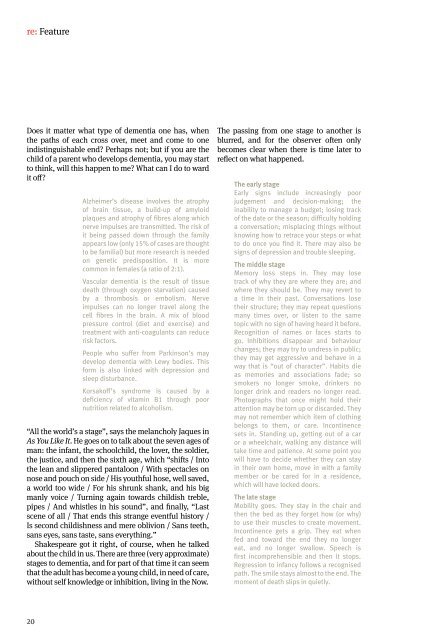A Norton Rose Group magazine Issue 3 Re: WoRk dementia the ...
A Norton Rose Group magazine Issue 3 Re: WoRk dementia the ...
A Norton Rose Group magazine Issue 3 Re: WoRk dementia the ...
Create successful ePaper yourself
Turn your PDF publications into a flip-book with our unique Google optimized e-Paper software.
e: Feature<br />
Does it matter what type of <strong>dementia</strong> one has, when<br />
<strong>the</strong> paths of each cross over, meet and come to one<br />
indistinguishable end? Perhaps not; but if you are <strong>the</strong><br />
child of a parent who develops <strong>dementia</strong>, you may start<br />
to think, will this happen to me? What can I do to ward<br />
it off?<br />
20<br />
Alzheimer’s disease involves <strong>the</strong> atrophy<br />
of brain tissue, a build-up of amyloid<br />
plaques and atrophy of fibres along which<br />
nerve impulses are transmitted. The risk of<br />
it being passed down through <strong>the</strong> family<br />
appears low (only 15% of cases are thought<br />
to be familial) but more research is needed<br />
on genetic predisposition. it is more<br />
common in females (a ratio of 2:1).<br />
Vascular <strong>dementia</strong> is <strong>the</strong> result of tissue<br />
death (through oxygen starvation) caused<br />
by a thrombosis or embolism. Nerve<br />
impulses can no longer travel along <strong>the</strong><br />
cell fibres in <strong>the</strong> brain. A mix of blood<br />
pressure control (diet and exercise) and<br />
treatment with anti-coagulants can reduce<br />
risk factors.<br />
People who suffer from Parkinson’s may<br />
develop <strong>dementia</strong> with Lewy bodies. This<br />
form is also linked with depression and<br />
sleep disturbance.<br />
Korsakoff’s syndrome is caused by a<br />
deficiency of vitamin B1 through poor<br />
nutrition related to alcoholism.<br />
“All <strong>the</strong> world’s a stage”, says <strong>the</strong> melancholy Jaques in<br />
As You Like It. He goes on to talk about <strong>the</strong> seven ages of<br />
man: <strong>the</strong> infant, <strong>the</strong> schoolchild, <strong>the</strong> lover, <strong>the</strong> soldier,<br />
<strong>the</strong> justice, and <strong>the</strong>n <strong>the</strong> sixth age, which “shifts / Into<br />
<strong>the</strong> lean and slippered pantaloon / With spectacles on<br />
nose and pouch on side / His youthful hose, well saved,<br />
a world too wide / For his shrunk shank, and his big<br />
manly voice / Turning again towards childish treble,<br />
pipes / And whistles in his sound”, and finally, “Last<br />
scene of all / That ends this strange eventful history /<br />
Is second childishness and mere oblivion / Sans teeth,<br />
sans eyes, sans taste, sans everything.”<br />
Shakespeare got it right, of course, when he talked<br />
about <strong>the</strong> child in us. There are three (very approximate)<br />
stages to <strong>dementia</strong>, and for part of that time it can seem<br />
that <strong>the</strong> adult has become a young child, in need of care,<br />
without self knowledge or inhibition, living in <strong>the</strong> Now.<br />
The passing from one stage to ano<strong>the</strong>r is<br />
blurred, and for <strong>the</strong> observer often only<br />
becomes clear when <strong>the</strong>re is time later to<br />
reflect on what happened.<br />
The early stage<br />
early signs include increasingly poor<br />
judgement and decision-making; <strong>the</strong><br />
inability to manage a budget; losing track<br />
of <strong>the</strong> date or <strong>the</strong> season; difficulty holding<br />
a conversation; misplacing things without<br />
knowing how to retrace your steps or what<br />
to do once you find it. There may also be<br />
signs of depression and trouble sleeping.<br />
The middle stage<br />
Memory loss steps in. <strong>the</strong>y may lose<br />
track of why <strong>the</strong>y are where <strong>the</strong>y are; and<br />
where <strong>the</strong>y should be. They may revert to<br />
a time in <strong>the</strong>ir past. Conversations lose<br />
<strong>the</strong>ir structure; <strong>the</strong>y may repeat questions<br />
many times over, or listen to <strong>the</strong> same<br />
topic with no sign of having heard it before.<br />
<strong>Re</strong>cognition of names or faces starts to<br />
go. Inhibitions disappear and behaviour<br />
changes; <strong>the</strong>y may try to undress in public;<br />
<strong>the</strong>y may get aggressive and behave in a<br />
way that is “out of character”. Habits die<br />
as memories and associations fade; so<br />
smokers no longer smoke, drinkers no<br />
longer drink and readers no longer read.<br />
Photographs that once might hold <strong>the</strong>ir<br />
attention may be torn up or discarded. <strong>the</strong>y<br />
may not remember which item of clothing<br />
belongs to <strong>the</strong>m, or care. incontinence<br />
sets in. standing up, getting out of a car<br />
or a wheelchair, walking any distance will<br />
take time and patience. At some point you<br />
will have to decide whe<strong>the</strong>r <strong>the</strong>y can stay<br />
in <strong>the</strong>ir own home, move in with a family<br />
member or be cared for in a residence,<br />
which will have locked doors.<br />
The late stage<br />
Mobility goes. <strong>the</strong>y stay in <strong>the</strong> chair and<br />
<strong>the</strong>n <strong>the</strong> bed as <strong>the</strong>y forget how (or why)<br />
to use <strong>the</strong>ir muscles to create movement.<br />
incontinence gets a grip. <strong>the</strong>y eat when<br />
fed and toward <strong>the</strong> end <strong>the</strong>y no longer<br />
eat, and no longer swallow. speech is<br />
first incomprehensible and <strong>the</strong>n it stops.<br />
<strong>Re</strong>gression to infancy follows a recognised<br />
path. <strong>the</strong> smile stays almost to <strong>the</strong> end. <strong>the</strong><br />
moment of death slips in quietly.




